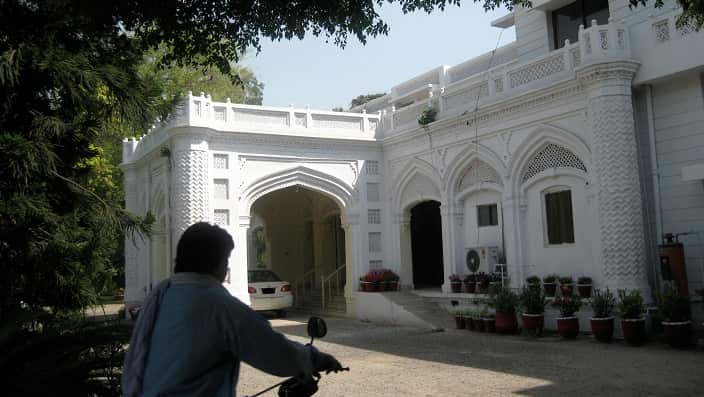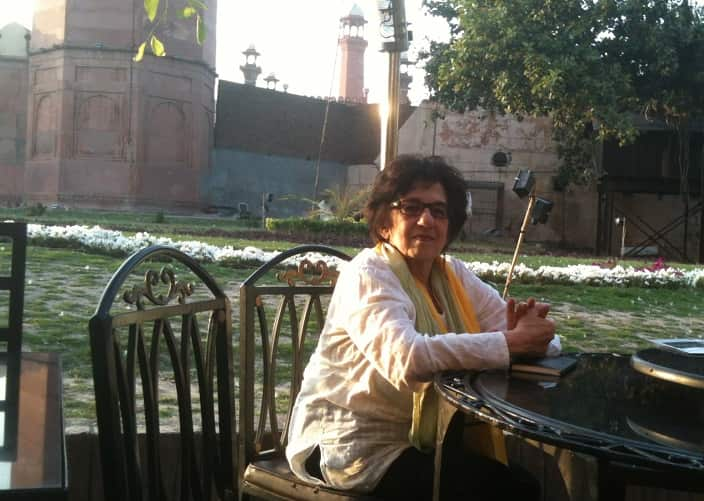Lahore-born Jewish woman Hazel Kahan resides in the United States and currently hosts community radio shows. She lives at her house in the woods, away from the hustle-bustle of urban areas.
Talking to SBS Urdu Hazel says that Pakistan has a mystical place in her life.
“I was born in Lahore. My parents were refugees from Europe and came to what was India at that time, the British Raj period in 1937.
“My home in Lahore, even my room was very special to me.
“Whenever I was away [to boarding school and later on], I always thought about that house. Since the house was in Lahore, the city also took some magic for me.
In the 1970s, her family moved abroad from Pakistan. Hazel left too and lived in various countries including England, Australia, Israel, and the US.
But after four decades, she made a journey back to her original home.

READ MORE
Visiting Pakistan after forty years
“When my parents died, there was no one left who I knew or to someone, I could talk to about Lahore,” Hazel recalls.
“I went back to the city after forty years. I only wanted to find out if the house was standing.
Hazel recalls that it was an “anxious” journey. She didn’t know anyone in the city nor how things have changed there.
“At that time when I was growing up, Lahore airport was very small, but it had changed a lot. You went to the tarmac and climb the stairs [to get into the plane]. Now, it was a huge international airport.
“As soon as I got out of the airport and smelled the air of Lahore, I knew was back there.”
The next step was to locate her house as she hadn’t seen her house for decades.
“I didn’t know anyone anymore I thought. So I stayed in a small hotel. I just wanted to get my legs on steady ground.
“I was so scared and anxious that my house wouldn’t be there,” recalls Hazel.
Hazel stayed in the hotel for a couple of days until she finally decided to go to the house.
“The house now had guards, there were metal gates. It turned out that the house was now being owned by a prominent political family.”
But the guards refused to let her in. She requested to at least see the house even as she stayed in the car.
“The house was completely different. It was white. In my days, it was terracotta and bricks, and bougainvillea.
Later on, the hotel staff helped her in finding the people who now lived in the house.
“They invited me to a family dinner on Friday and I met the four generations, their extended family.
“It was a wonderful thing that I was welcomed in the most amazing way.”
“Living a bit in Lahore, I realised that we were part of Lahore’s history.
“My parents who were doctors had a prominent place in the town. They had a position amongst the elite, because of their profession.
“So after forty years of not being there, my connections were increased.

It is estimated that around one thousand Jews were living in Pakistan at the time of its independence in 1947 from the then British Empire. The small population further decreased overtime.
“Under British jurisdiction, the Jews in the area became known as Pakistani, and were treated with tolerance. In the early twentieth century, a variety of associations existed to serve the Jewish community: the Young Man's Jewish Association, founded in 1903, whose aim was to encourage sports as well as religious and social activities of the Bene Israel in Karachi, the Karachi Bene Israel Relief Fund, established to support poor Jews in Karachi, and the Karachi Jewish syndicate, formed in 1918, to provide homes to poor Jews at reasonable rents.” – Jewish Virtual Library
Hazel is from a Jewish background and says that it was the Muslims who helped her parents settle in Lahore.
“Everyone knew we were Jewish. But there was never a problem. They [people] used to say you are the people of the book like us and we are also the people of the book.
“It was only when it became an Israeli issue.
“We were known as Jews but never in any way connected to Israel, even though our families were there.
“My parents were then persecuted for being Jewish. Connections were made that they were spies. So then it became difficult and then my parents left.
But Hazel says that she tells a different story of the “other Pakistan”.
“I say to people look Pakistan, it is difficult to say Pakistan is not a bad country in many ways, it is a cruel country in many ways and so many others are.
“But to me and my family, they gave us refuge.
“Pakistan was a place where we were safe; we were never in harm’s way.
“So to me being a Jew, it wasn’t something to be persecuted for. We were just protected by the Pakistanis.
Hazel says at the time, Pakistan and Lahore, in particular, was a cosmopolitan cultural center.
“Religion was not a defining character in those days. So it was never an issue and we never made an issue of being Jewish. We never hid it.”
Hazel says that although she does not plan to visit Pakistan soon but someday she will go back again to see Lahore.
